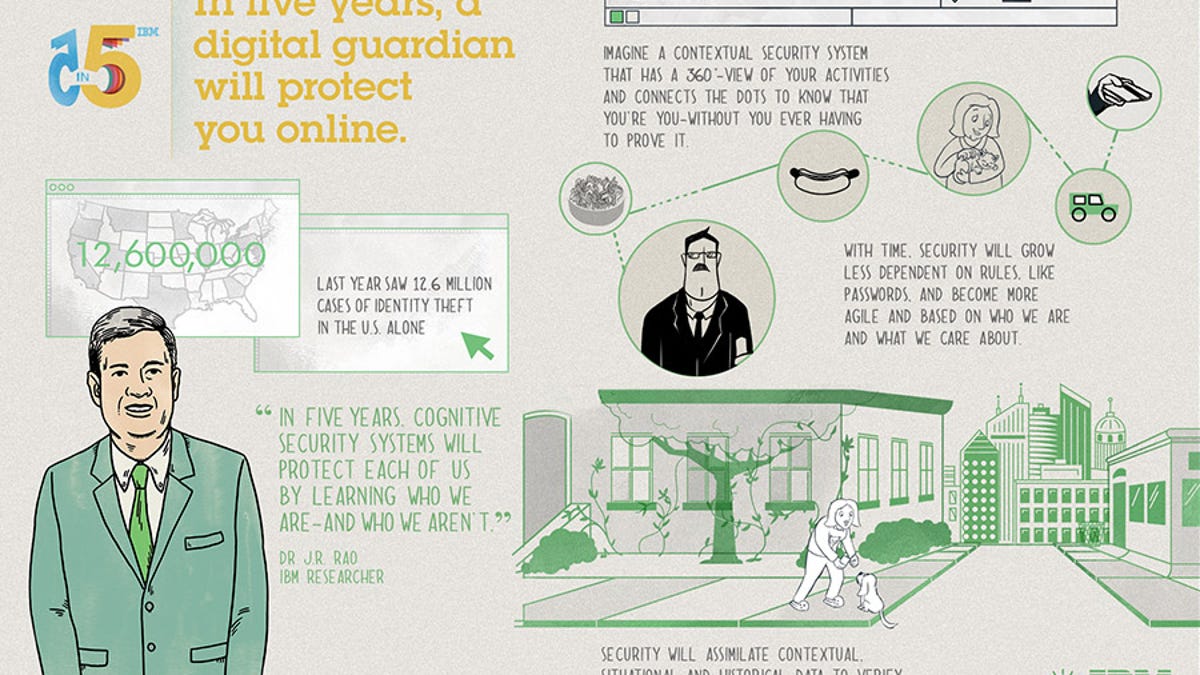IBM's 5 in 5: The five ideas that will change your life
From DNA medical treatments to digital guardians, IBM's annual "5 in 5" list looks at the things that will change our lives in the next five years.
Imagine doctors using your own DNA in diagnosing and treating you for everything from cancer to heart disease to stroke. According to researchers at IBM, that technology, now in use in just a handful of cases, will become common practice in the next five years.
IBM researchers included DNA sequencing and other ideas on their annual "5 in 5" list this year. It's a list of what they call the five "innovations that will change the way we live" in the five years to come.
The theme of this year's list (below) is "in the future everything will learn."
1. Buying local will beat online
Bernie Meyerson, vice president of innovation at IBM, told the co-hosts of "CBS This Morning" that "bottom line, you walk in, you want to buy a camera for $1,000, you would really like to have a feel for this."
That does not mean we will revert to how we used to shop. Meyerson said the future of shopping is a convergence of online and brick-and-mortar shopping, where a retailer knows your preferences and is prepared to tailor to your needs.
"Imagine walking into a store that knew your persona," Meyerson said. "It knows what you like. It actually directs you to the place where those cameras are located, and somebody meets you there. And if you like it, you press a button. It identifies you maybe from a fingerprint, and you go out the door and they hand you the camera."
2. Doctors will use your DNA to keep you well
"Right now the best you can do is law of averages. You try to get it right," Meyerson said. "Imagine being able to specifically look at someone's DNA and say, 'Wait a minute, I know you have leukemia, but in fact, the defect in your DNA is more similar to people who have, for instance, kidney cancer.' So instead of treating you with the classic drugs for leukemia, they treat you with the kidney cancer drugs. And you go into remission."
Meyerson said that is a real case, and is a sign of things to come. "That kind of customization, because of the understanding of your basic makeup from your DNA -- that will happen." In the last few years, IBM has gotten into electronic automation technology that will give people and their doctors individual genetic records for less than $1,000.
3. The emergence of the "digital guardian"
"The digital guardian is basically something that runs around incessantly, on your behalf, making sure your data remains private, and the people using it are only those who are authorized," Meyerson told the co-hosts of "CBS This Morning."
4. The classroom will learn you
The idea here, Meyerson said, is allowing teachers to know in advance which children might have challenges or specific ways that they learn best. "Do you really want to lose half a year to some poor child who has a mild case of dyslexia because you didn't know?"
The classroom of the future, according to IBM, will use data from testing, attendance, and in-class behavior, and will equip teachers with tools to understand each student, and offer customized a curriculum.
5. Smarter cities and no more traffic jams
Smartphones, social media, and other mobile and online engagement will continue to grow, giving everyday citizens more access to city leaders, and giving those leaders more of a direct connection with citizens. This will allow cities to better allocate resources, and could, according to Meyerson, help in addressing everyday problems, like traffic jams.
"My traffic report isn't, hey you are going to be stuck," Meyerson said. "My traffic report is, we fixed it, you won't be stuck."
< scale="noscale" salign="lt" type="application/x-shockwave-flash" background="#000000" width="600" height="379" allowFullScreen="true" allowScriptAccess="always" FlashVars="pType=embed&si=254&pid=7vc5izwZLdNa&url=http://www.cbsnews.com/video/5-in-5-the-five-innovations-ibm-says-will-change-your-life" />
This story originally appeared on "CBS This Morning."
